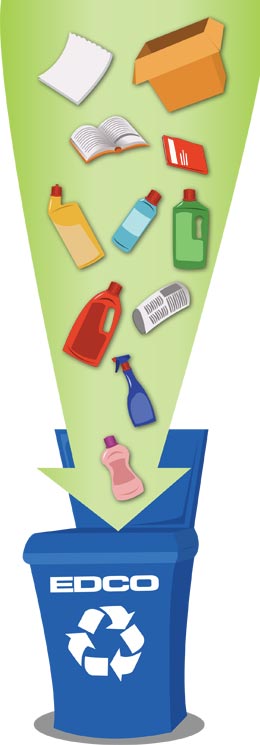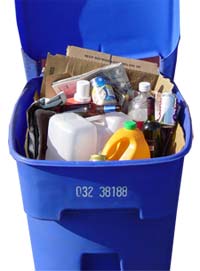Resource Center
Recycling Information, Service Brochures & Posters
Imperial Beach Single-Family Residential Service Guide
Trash, Recycling, and Organics Posters
_____________________________________________
Recycling is Easy with EDCO! You can put all of your recyclables in one container. All you need to remember is what you CAN and what you CAN’T put in your blue recycling cart.
Additional blue residential recycling carts are available at no additional cost! Click here to place a request.

EDCO's Recycling Guidelines

Glass Bottles & Jars*
Recycle all food and beverage containers—clear and colored glass.
Cardboard & Styrofoam Packaging
Flatten or cut boxes and styrofoam to a size that fits comfortably inside recycling cart. No styrofoam packing peanuts.
Newspapers
Recycle your newspaper and everything that is delivered with it—including inserts, coupons, etc.
Cans*
Recycle aluminum cans and steel cans—including clean & dry paint cans, and empty aerosol cans. Also, recycle aluminum foil.
Plastic Containers*
Recycle all rigid plastics, such as bottles, jugs, and jars, marked  to
to  , and all beverage containers labeled “CA Redemption Value” or “CA Cash Refund” including:
, and all beverage containers labeled “CA Redemption Value” or “CA Cash Refund” including:
- Food & Beverage Containers — Milk, soda, water, salad dressings, cooking oil, yogurt containers, cottage cheese containers, etc.
- Jars & Canisters — Peanut butter jars, mayonnaise jars, aspirin bottles and 35mm film canisters.
- Cleaning Products & Detergents — Bleach, detergent, soap, shampoo, drain cleaners, etc. (Containers must be empty.)
- Automotive & Yard Care Products — EMPTY motor oil, antifreeze, plant food and herbicide containers.
- Miscellaneous Rigid Plastics — Including, but not limited to, plastic buckets with metal handles, plastic drums, totes & empty garbage cans, plastic milk crates, kitty litter buckets, laundry baskets, lawn furniture, and pet carriers, plastic toys, plastic agricultural trays/pots, plastic pallets, and other mixed plastic containers.
Look on the bottom of a plastic item and you should find the “chasing arrow” symbol with a number in the center like the two shown ( to
to  ).
).
Mixed Paper
Recycle virtually all clean and dry paper including: writing paper (all colors), computer paper, Xerox paper, “no carbon required” (NCR) forms, catalogs, brochures, magazines, junk mail, phone books, post-it type notes, and shredded paper (place shredded paper inside paper bags to contain shreds). EDCO accepts them all, PLUS if those items have staples, window envelopes, or even those little metal clasps on legal envelopes, they’re OK, too! But, please, no large metal items like clasps on Acofastener notebooks or 3-ring binders.
You can also recycle cereal boxes and other clean food packaging, including cake boxes, flour bags, frozen dinner boxes, paper egg cartons, and soda/beer 12-pack carrying boxes. Also recycle paper grocery bags, gift boxes, shoe boxes, paper gift wrap, calendars, and core tubes from paper towels, etc.
Cartons*
To recycle cartons, place empty cartons in recycling cart along with all paper, metal, plastic, and glass recyclables accepted through the program.
*All food and beverage containers do not require rinsing as long as they are empty and free of food and liquids.
Recycling Alternatives:
- Plastic grocery bags can be returned to grocery stores for recycling or they can be reused.
- Batteries and light bulbs need to be disposed of properly and not placed in trash or recycling containers. Visit our website for proper disposal of HHW items.
Large items
Items that are too large to place in blue recycling cart can be dropped off at no cost at any of our Buyback Centers.
Recycling Dos

What’s OK to Recycle?
Food & Beverage Containers
Milk, soda, water cooking oil and salad dressings
Jars & Canisters
Peanut butter jars, soap & mayonnaise jars, aspirin bottles and 35mm film canisters.
Cleaning Products & Detergents
Bleach, detergent, soap, shampoo, drain cleaners, etc.
Automotive & Yard Care Products
EMPTY anifreeze, oil, plant food and herbicide containers
Recycling Don’ts
NON-RECYCLABLES include:

- plastic bags
- newspaper delivery bags
- ceramics
- light bulbs
- window glass
- mirrors
- wax paper
- food-soiled paper
What is Source Reduction?
Source Reduction simply means reducing the amount of trash you generate…by thinking before you act.
We are facing the challenge of having too much trash. Most likely, you’re aware of this and are doing your part to recycle. Believe it or not, you are reducing your impact on our environment by being responsible for your trash disposal. By recycling, you are lengthening the life of our landfills, saving natural resources, and conserving energy.
Now it’s time to go one step further and think about how to reduce waste in the first place by going to the source. Sounds complicated, right?
Actually, if you reach for a sponge before going for the paper towels, you are already reducing waste at the source or practicing source reduction.
Precycling

Practicing the art of source reduction is as easy as reusing your grocery bags or replacing paper napkins with cloth ones. These little changes are part of a practice called “precycling.” Precycling is one of the best habits a consumer can adopt as part of an effective and simple source-reduction plan.
Precycling simply means that each time you reach for an item in the grocery store, department store, fast food restaurant, or wherever, you consider how your purchase and its packaging will affect the environment.
Packaging
By purchasing products with less packaging, you’ll reduce the amount of trash you create. You’ll have even less to throw away by choosing packaging you can recycle. The more you precycle, the less trash you produce and the fewer resources you consume. In other words, reduce waste at the source by precycling!
Be picky about packaging…buy products you know you can either recycle here in our community or reuse at home. Purchase minimally packaged items-avoid multilayered and unnecessary fancy packaging.
Avoid Disposables
Avoid disposables…don’t buy products purposely made to be used once or only a few times and thrown away. (i.e., disposable batteries, diapers, cameras, razors). Instead, invest in reusable, long-lasting alternatives.
Buy in Bulk
Buy in bulk…whenever practical, purchase the largest size available. Not only will you be practicing source reduction, but you will also save money!
Source reduction by precycling means:
- you can recycle in your community by buying products in containers, like glass, aluminum, or paper.
- avoid single-serve convenience food items, like cups of soups and snack packs
- avoid plastic packaging
- keeping a reusable mug with you when you go
- bringing your own grocery bags to the store
Start today, and remember, every little bit helps!